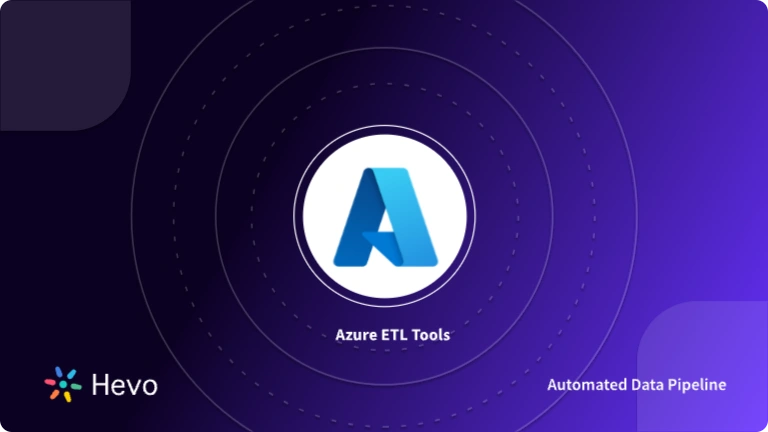 Quick Takeaway
Quick Takeaway- Hevo – Best for no-code cloud ETL
- Airflow – Best for workflow orchestration of complex ETL pipelines
- Airbyte – Best open-source ETL tool
- Meltano – Best for open-source ELT with analytics integration
- Hadoop – Best for big‑data batch ETL
- Informatica – Best enterprise-grade ETL and data governance
- AWS Glue – Best serverless ETL for AWS ecosystem
- IBM Infosphere – Best for enterprise data integration across on‑prem and cloud
- Azure Data Factory – Best ETL orchestration within Azure
- Google Dataflow – Best for data‑processing pipelines and stream/batch ETL
- Stitch – Best lightweight cloud ETL for SMBs
- Oracle Data Integrator (ODI) – Best for Oracle‑centric data integration
- Integrate.io – Best no‑code ETL for rapid deployment
- Fivetran – Best ETL tool for enterprises
- Qlik – Best for integrated BI & ETL workflows
- Portable.io – Best for high‑connector‑volume ELT
- Skyvia – Best budget‑friendly ETL with no‑code simplicity
- Matillion – Best cloud‑native ETL/ELT for data warehouses
- SSIS – Best ETL for Microsoft SQL Server environments
- Rivery – Best unified ETL + Reverse ETL platform
If you ever wondered how businesses manage and control vast amounts of data, you probably have come across the term ETL. ETL stands for Extract, Transform, Load, and essentially means collecting data from different sources, converting them into a usable format, and loading them into a destination system such as a database or data warehouse.
ETL process can become tedious and complex as the number of sources and data volume increases. This is where ETL tools come in. They can automate the process and simplify it for you. But which tool should you use? Choosing the right ETL tool is a crucial step while deciding your tech stack, and it could get really confusing if you are not familiar with the evaluation aspects and available tools. In this blog, I will walk you through a list of some of the best ETL tools, mentioning their features and pricing so that you can make an informed choice.
- 1No-code cloud ETL for effortless, maintenance-free pipeline creation.Try Hevo for Free
- 2Open-source ETL offering flexible, customizable connectors for full control.
- 3Enterprise-grade managed ETL with high reliability and seamless scalability.
- 35Tools considered
- 25Tools reviewed
- 20Best tools chosen
Table of Contents
What is ETL?
ETL includes integrating data from various sources into a single, unified repository. It consists of three main procedures: collecting and cleansing data (applying standardized business rules) and loading it into a database or warehouse.
- Extract: It is the process of getting data from multiple source systems (databases, files, APIs, or others). The extracted data may be structured, semi-structured, or unstructured.
- Transform: During this phase, the stranded data is taken in a suitable format for analysis and reporting. This also involves cleansing, filtering, aggregating, and assuring data quality using business rules.
- Load: This refers to loading the transformed data into the target data warehouse, database, or some other data repository, making it accessible for user applications and analysis.
Learn how ETL vs. Reverse ETL compares in serving different data needs.
Why is ETL Important?
The ETL process proves useful for businesses during the decision-making process. Here is why:
- Allows you to integrate multiple data sources – It centralizes all of your data under a single roof for easier analysis.
- Ensures data quality – Transformation cleans, standardizes, and provides accurate data.
- Time and labor-saving – By automating data extraction, ETL minimizes manual labor and speeds up analysis.
- Scales with your needs: As your data requirements grow, ETL can adapt to handle increased complexity, whether you’re a startup or a large corporation.
What are ETL Tools?
ETL tools are software solutions that make the ETL process easier. They do most of the heavy lifting for extracting, transforming, and loading data, often providing ETL automation, scheduling, error monitoring, and data management.
Using an ETL tool saves you from writing complex scripts and lets you focus on using your data, not managing it.
How Do ETL Tools Work?
Most ETL tools function in the following manner:
- Data Extraction: Connect to more than one data source, such as SQL databases, flat files, cloud storage, or SaaS applications.
- Data Transformation: Within this stage, repetitive data is removed, validated, and modified. This could be things like touching up old records, converting formats, or applying business rules.
- Data Loading: Finally, clean data is uploaded to the target store, like a data warehouse or analytics platform.
For example, ETL tools enable moving sales data from a CRM, cleaning the information, and populating it into tools such as Google BigQuery for analytical processing. Various third-party ETL tools also provide additional features such as data governance, observability, etc.
Types of ETL Tools
Based on your requirements, ETL tools can be classified into several categories:
1. Open Source Tools
Open-source ETL tools are community-driven solutions that provide cost-effective ways to extract, transform, and load data. They provide flexibility and customization options.
Examples: Airbyte and Hadoop.
2. Cloud ETL Tools:
Cloud-based ETL tools operate on cloud platforms, enabling organizations to seamlessly handle data integration without managing physical infrastructure. They are suitable for modern and scalable infrastructures.
Examples: Fivetran, Hevo, and AWS Glue.
3. On-Premises
Some ETL methods work better with on-premises and legacy systems, such as outdated databases that adhere to antiquated data management conventions. They are suitable for businesses with stringent security requirements.
Examples: Informatica and SSIS.
4. Real-Time
These are real-time technologies that can load, enhance, and extract data. This kind of ETL solution is, therefore, growing in popularity as businesses look for quick, actionable information. These can perform real-time streaming.
Examples: Dataflow, Rivery.
5. Custom ETL Tools
Custom ETL tools are in-house solutions built to address unique business requirements, offering complete control over the ETL process. These tools cater to highly specific ETL workflows and integrate deeply into existing systems, ensuring tailored functionality. However, they require significant development effort, skilled resources, and ongoing maintenance.
What Makes an ETL Tool Stand Out?
Before choosing any ETL Tool for your organization, you must know the factors you should consider while making the decision. These few aspects make an ETL Tool stand out among the vast list of available options.
| Factor | Key Considerations | Why It Matters |
| Scalability | Can it handle growing data and real-time processing? | Ensures the tool adapts to business growth. |
| Ease of Use | Is it user-friendly, with minimal coding required? | Reduces setup time and reliance on experts. |
| Integration | Does it support your data sources and analytics tools? | Ensures seamless connectivity and workflows. |
| Cost | Is it affordable with no hidden fees? | Keeps the tool within budget. |
| Security | Does it offer encryption and compliance (e.g., GDPR, HIPAA)? | Protects sensitive data and meets regulations. |
| Automation | Can tasks be scheduled and automated? | Saves time and reduces manual effort. |
| Support | Is reliable customer support or community help available? | Ensures quick resolution of issues. |
| Trial/Demo | Is there a free trial or demo? | Allows evaluation before purchase. |
List of Best ETL Tools Available in 2025
1. Hevo
G2 Rating: 4.4
Gartner Rating: 4.4
Capterra Rating: 4.7
Hevo Data is one of the most highly rated ELT platforms that allows teams to rely on timely analytics and data-driven decisions. You can replicate streaming data from 150+ data sources, including MySQL, MariaDB, BigQuery, Redshift, etc., to the destination of your choice without writing a single line of code. Hevo’s architecture ensures the optimal usage of system resources to get the best return on your investment. Hevo’s intuitive user interface caters to more than 2000 customers across 45 countries.
Key features:
- Stream and Batch Processing: Hevo Data supports both, real-time data streaming and batch processing for large volumes of complex datasets, enabling businesses to ingest and process data from multiple sources in real time. This ensures that the data in the target systems is always up-to-date, facilitating timely insights and decision-making.
- Reliability: Hevo provides robust error handling and data validation mechanisms to ensure data accuracy and consistency. Hevo also has a separate failure handling policy to address failed/skipped events.
- Cost-effectiveness: Hevo offers transparent and straightforward pricing plans that cater to businesses of all sizes. The pricing is based on the volume of data processed, ensuring that businesses only pay for what they use.
Pricing: Hevo provides the following pricing plan:
- Free Trial for 14 days
- Starter – $239 per month
- Professional – $679 per month
- Business Critical – Contact sales
Why Use It? It’s user-friendly, supports real-time & batch data pipelines, and offers a no-code interface.
Best For: Startups and mid-sized businesses, teams with limited engineering resources, and organizations seeking fast, seamless data integration.
Customer Testimonial
Facing challenges migrating your data from various sources? Migrating your data can become seamless with Hevo’s no-code intuitive platform. With Hevo, you can:
- Automate Data Extraction: Effortlessly pull data from 150+ connectors( 60+ free sources).
- Transform Data effortlessly: Use Hevo’s drag-and-drop feature to transform data with just a few clicks.
- Seamless Data Loading: Quickly load your transformed data into your desired destinations.
Try Hevo and join a growing community of 2000+ data professionals who rely on us for seamless and efficient migrations.
Get Started with Hevo for Free2. Airflow
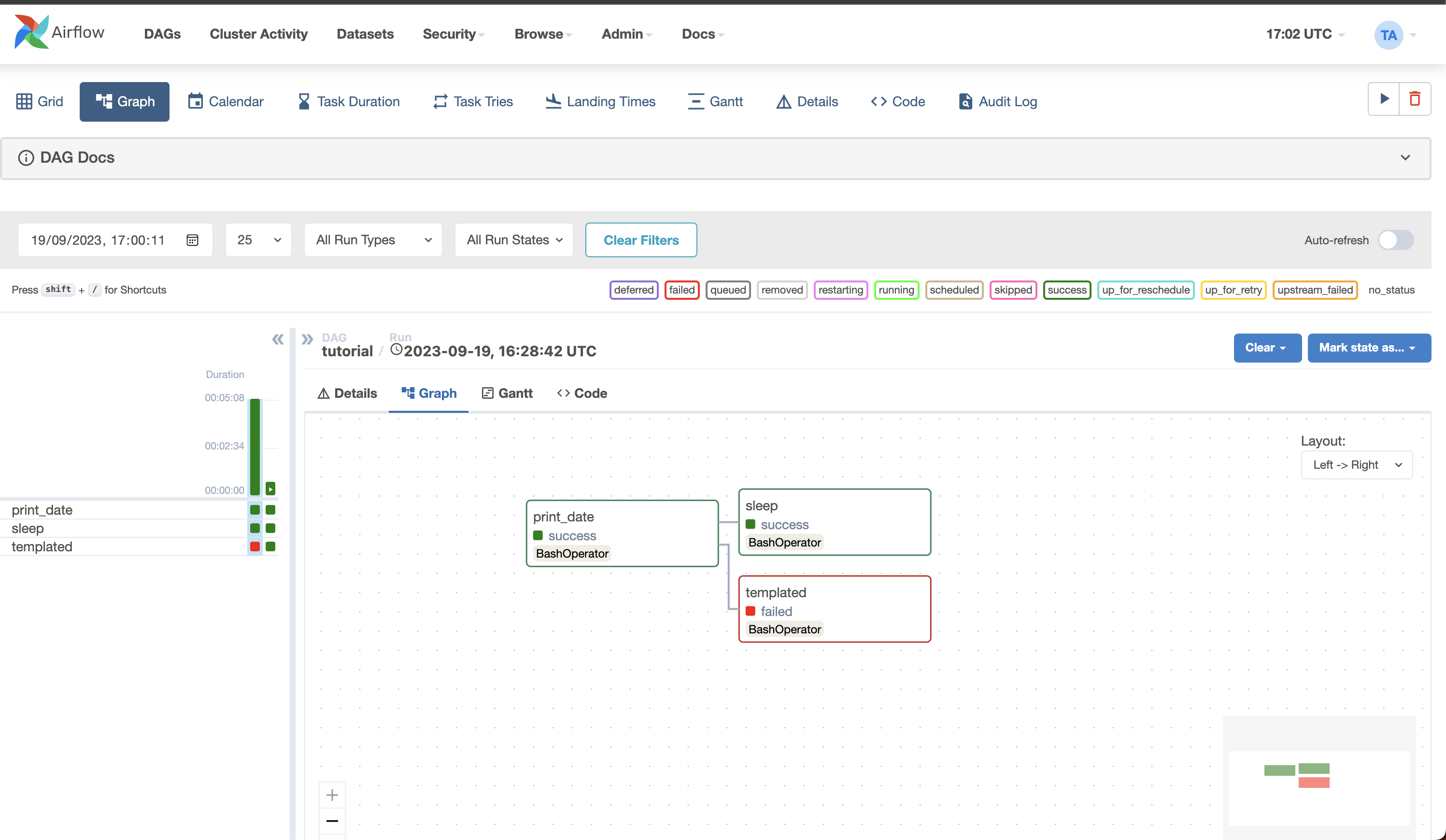
G2 Rating: 4.3
Capterra Rating: 4.6
Apache Airflow is an open-source platform bridging orchestration and management in complex data workflows. Originally designed to serve the requirements of Airbnb’s data infrastructure, it is now being maintained by the Apache Software Foundation. Airflow is one of the most used tools for data engineers, data scientists, and DevOps practitioners looking to automate pipelines related to data engineering.
Features:
- Easy usability: Deploying Airflow requires just a little knowledge of Python.
- Open Source: It is an open-source platform, making it free to use and resulting in many active users.
- Numerous Integrations: Platforms like Google Cloud, Amazon AWS, and many more can be readily integrated using the available integrations.
- Python for coding: Beginner-level knowledge of Python is sufficient to create complex workflows on airflow.
- User Interface: Airflow’s UI helps monitor and manage workflows.
- Highly Scalable: Airflow can execute thousands of tasks per day simultaneously.
Pricing: Free
Why Use It? Highly customizable and open-source.
Best For: Developers seeking flexibility and engineering teams working with large, complex workflows that require scalability and customizability.
3. Airbyte
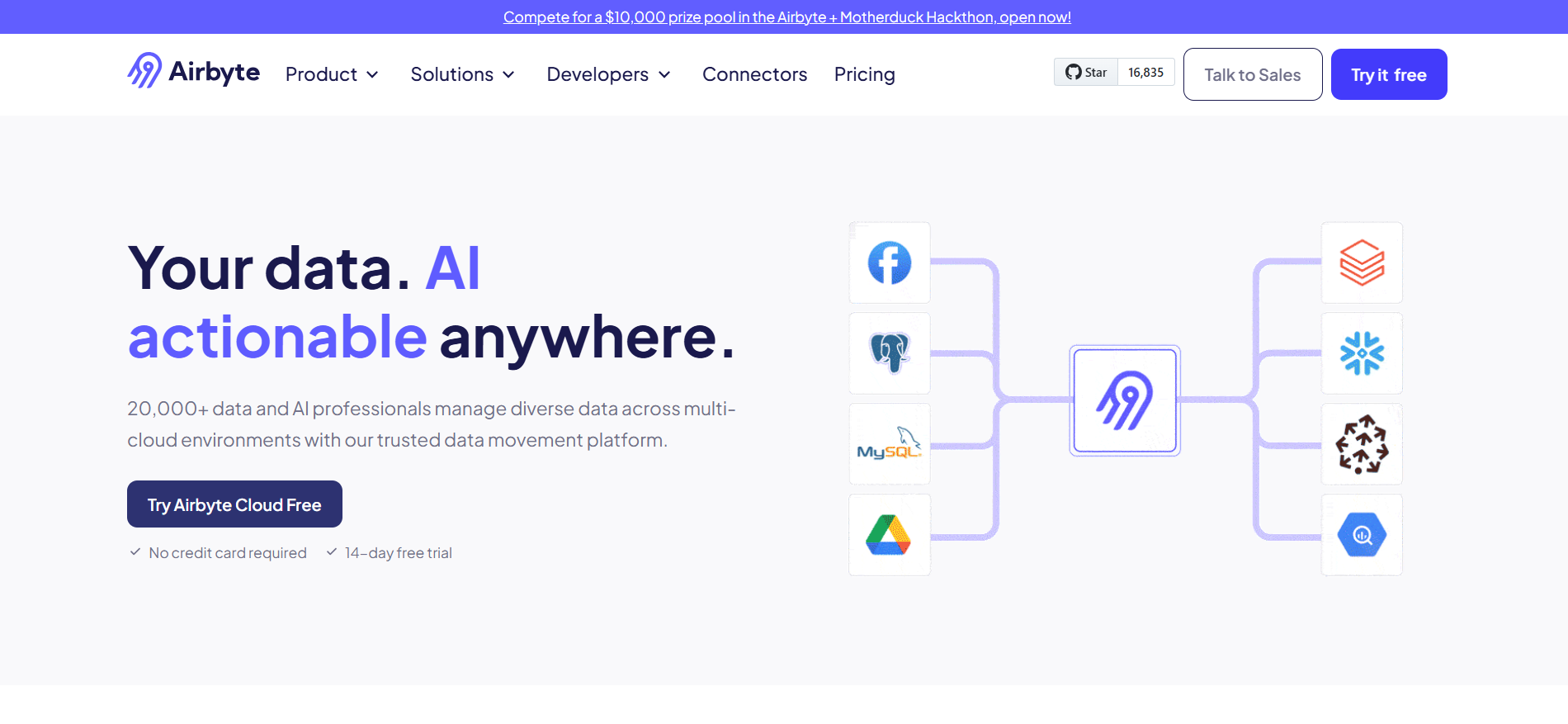
G2 Rating: 4.5
Gartner Rating: 4.6
Airbyte is a leading open-source platform featuring a library of 350+ pre-built connectors. While the catalog is extensive, it also allows you to build custom connectors for data sources and destinations not included in the list. Thanks to its user-friendly interface, creating a custom connector takes just a few minutes.
Features:
- Multiple Sources: Airbyte can easily consolidate numerous sources. You can quickly bring your datasets together at your chosen destination, even if they are spread over various locations.
- Massive variety of connectors: Airbyte offers 350+ pre-built and custom connectors.
- Open Source: Free to use, and with open source, you can edit connectors and build new connectors in less than 30 minutes without needing separate systems.
- Automation and Version Control: It provides a version-control tool and options to automate your data integration processes.
Pricing: It offers various pricing models:
- Open Source – Free
- Cloud – It offers a free trial and charges $360/mo for a 30GB volume of data replicated per month.
- Team – Talk to the sales team for the pricing details.
- Enterprise – Talk to the sales team for the pricing details.
Why Use It? Free and open-source, with robust integration options.
Best For: Cost-conscious teams, companies with specific integration needs, and engineering teams that prefer open-source solutions.
4. Meltano
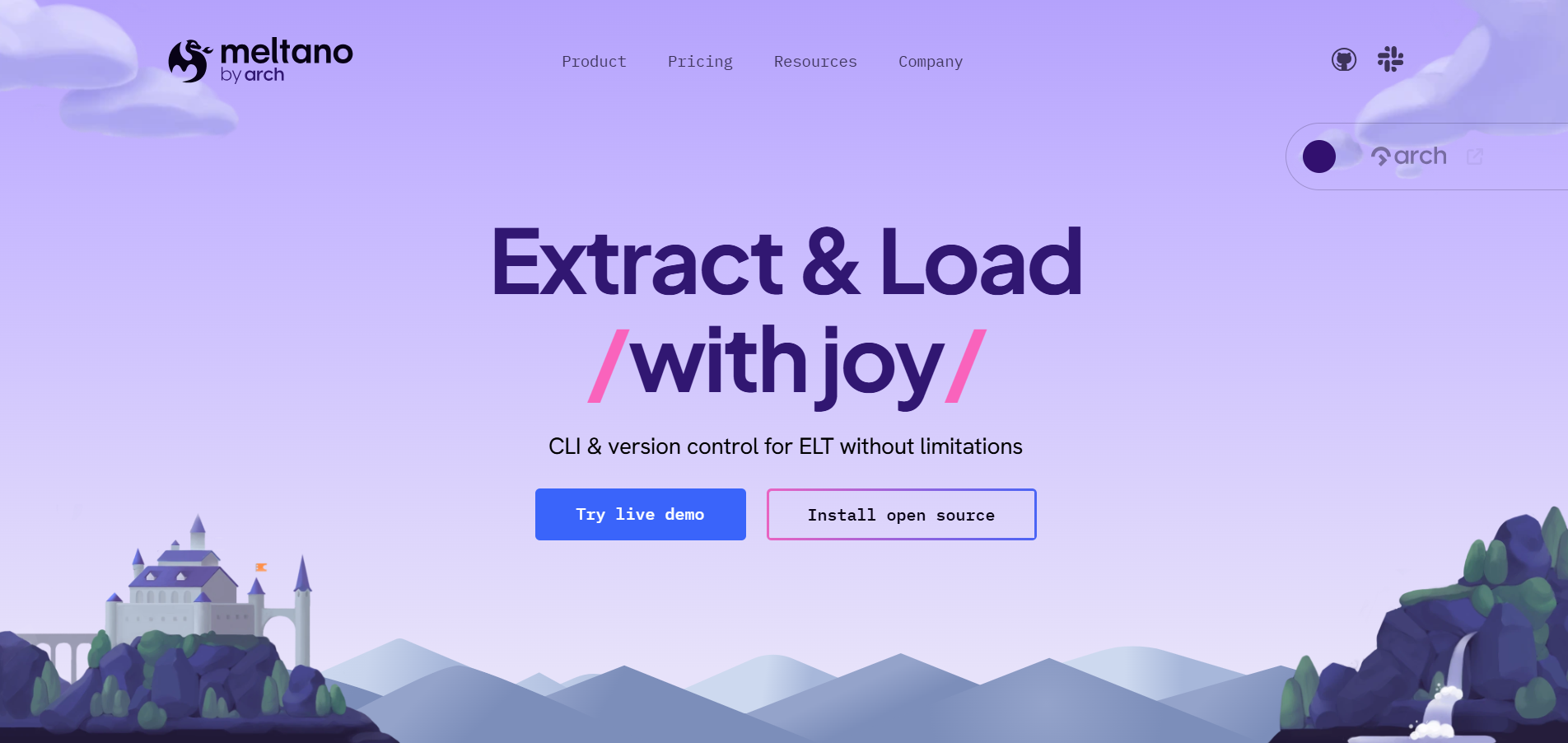
G2 Rating: 4.9(7)
Meltano is an open-source platform for managing the entire data pipeline, including extraction, transformation, loading, and analytics. It is pip-installable and comes with a prepackaged Docker container for swift deployment. This ETL tool powers a million monthly pipeline runs, making it best suited for creating and scheduling data pipelines for businesses of all sizes.
Key Features
- Cost-Efficiency: Pay only for the actual workloads that you run, regardless of data volume, with the choice to either manage the system yourself or use a managed orchestrator.
- Improved Efficiency: Build, optimize, debug, and fix connectors seamlessly, without needing support. Our team is here to help, not slow you down.
- Centralized Management: Manage all data pipelines, databases, files, SaaS, internal systems, Python scripts, and tools like dbt from one place in a snap.
- No Constraints: Add new data sources, apply PII masking before warehouse injection, develop custom connectors, and contribute pipelines from other teams.
Why Use It? Perfect for organizations seeking a flexible, open-source tool to handle their entire data pipeline.
Best For: Data teams that require a modular and extensible solution for managing data pipelines.
5. Hadoop
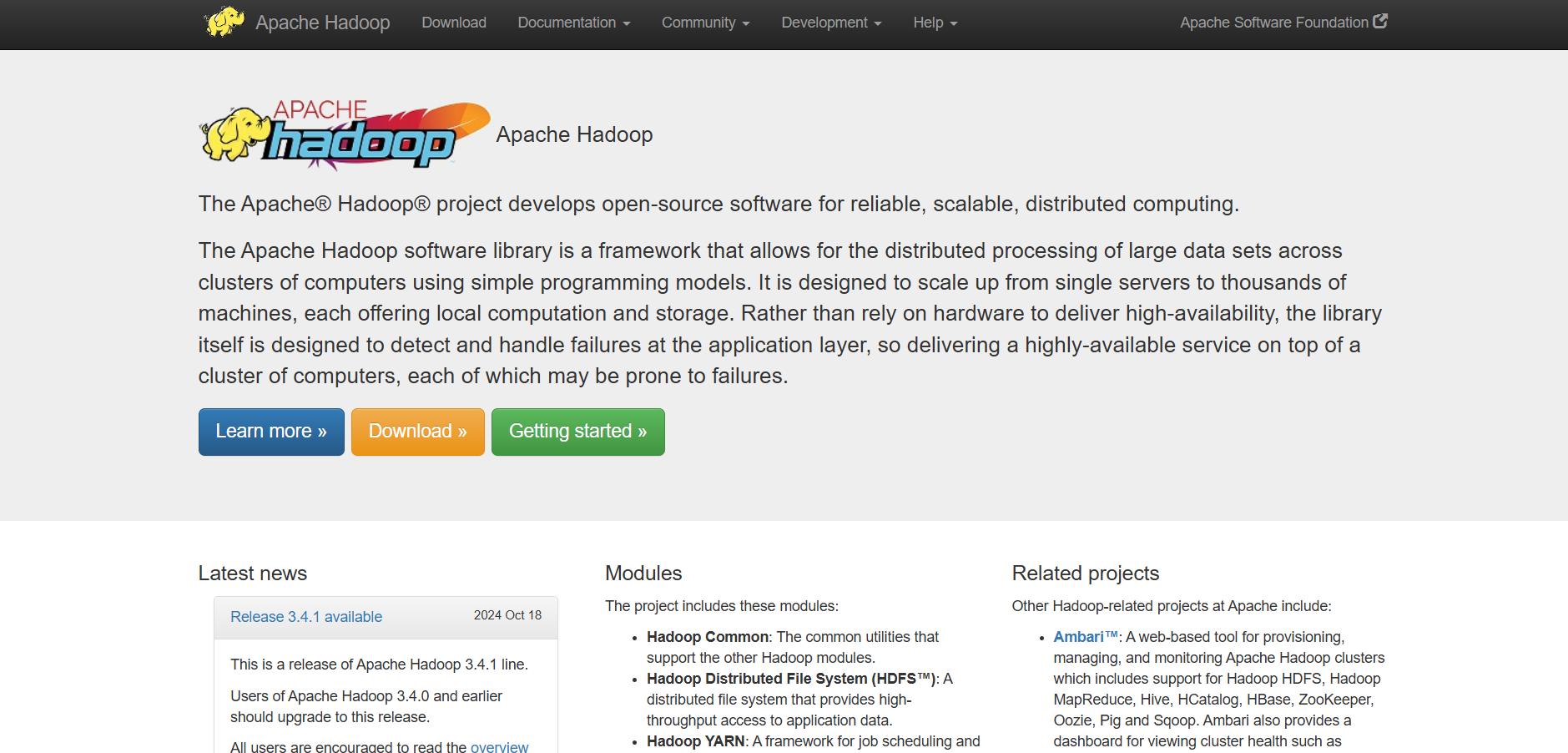
G2 Rating: 4.4(140)
Apache Hadoop is an open-source framework for efficiently storing and processing large datasets ranging in size from gigabytes to petabytes. Instead of using one large computer to store and process the data, Hadoop allows clustering multiple computers to analyze massive datasets in parallel more quickly. It offers four modules: Hadoop Distributed File System (HDFS), Yet Another Resource Negotiator (YARN), MapReduce, and Hadoop Common.
Features:
- Scalable and cost-effective: Can handle large datasets at a lower cost.
- Strong community support: Hadoop offers wide adoption and a robust community.
- Suitable for handling massive amounts of data: Efficient for large-scale data processing.
- High fault tolerance: Hadoop data is replicated on various data nodes in a Hadoop cluster, which ensures data availability if any of your systems crash.
Pricing: Free
Why Use It? Extensible data integration tool with CLI interface and built-in ELT orchestration.
Best For: Large enterprises needing to store and process big data efficiently in a distributed system.
6. Informatica
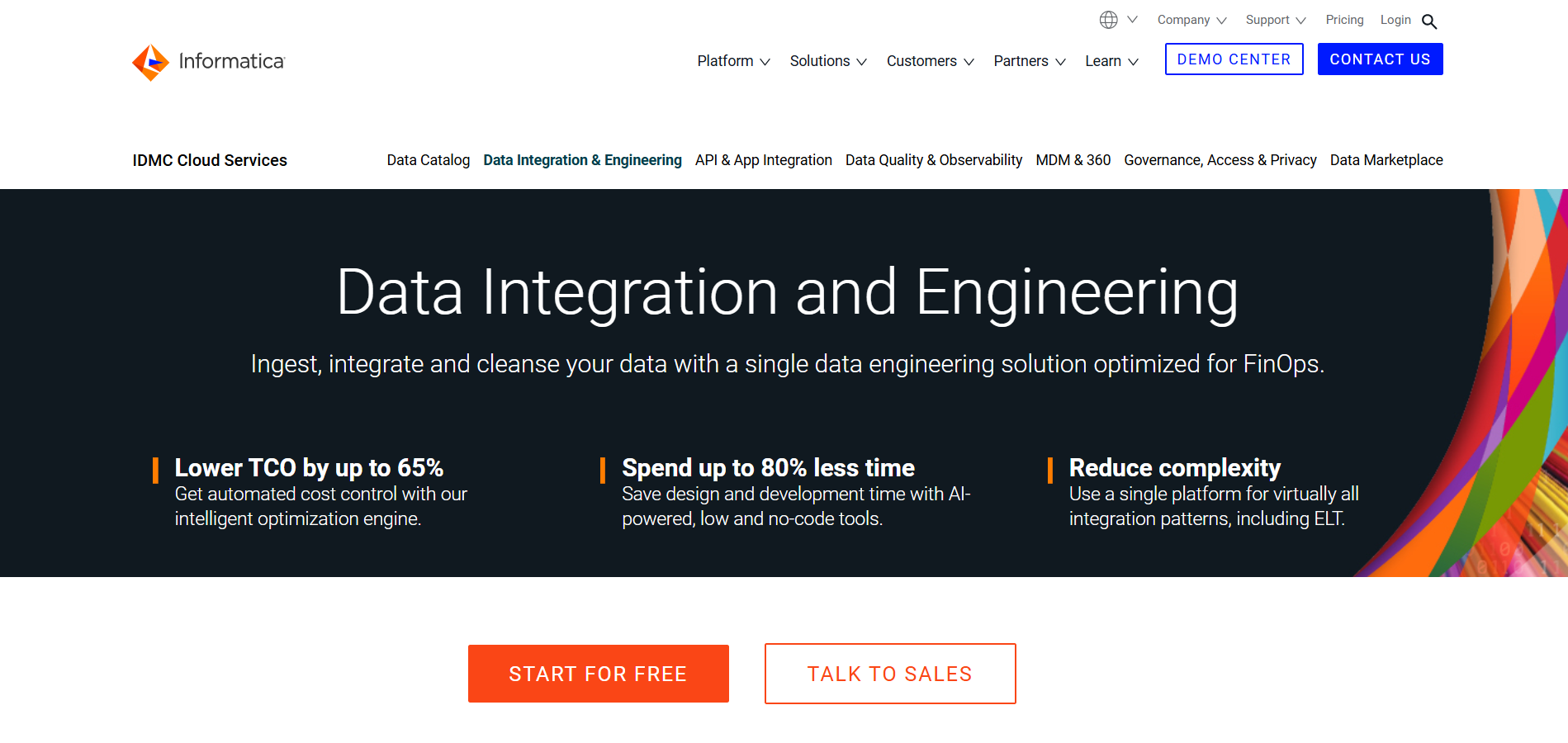
G2 Rating: 4.4(85)
Informatica PowerCenter is a common data integration platform widely used for enterprise data warehousing and data governance. PowerCenter’s powerful capabilities enable organizations to integrate data from different sources into a consistent, accurate, and accessible format. PowerCenter is built to manage complicated data integration jobs. Informatica uses integrated, high-quality data to power business growth and enable better-informed decision-making.
Key Features:
- Role-based: Informatica’s role-based tools and agile processes enable businesses to deliver timely, trusted data to other companies.
- Collaboration: Informatica allows analysts to collaborate with IT to prototype and validate results rapidly and iteratively.
- Extensive support: Support for grid computing, distributed processing, high availability, adaptive load balancing, dynamic partitioning, and pushdown optimization
Pricing: Informatica supports volume-based pricing. It also offers a free plan and three different paid plans for cloud data management.
Why Use It? Enterprise-grade data integration with AI-powered ETL automation and strong governance features.
Best For: Large enterprises with complex data workflows and stringent data governance needs.
7. AWS Glue
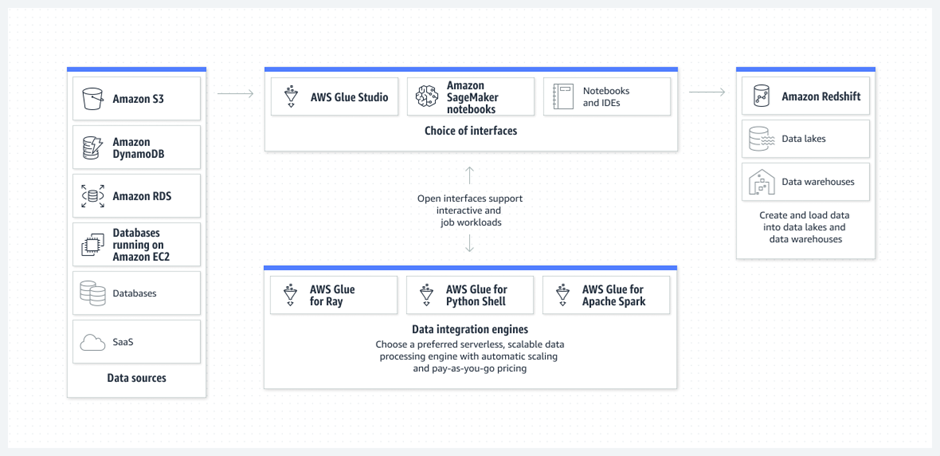
AWS Glue is a serverless data integration platform that helps analytics users discover, move, prepare, and integrate data from various sources. It can be used for analytics, application development, and machine learning. It includes additional productivity and data operations tools for authoring, running jobs, and implementing business workflows.
Key Features:
- Auto-detect schema: AWS Glue uses crawlers that automatically detect and integrate schema information into the AWS Glue Data Catalog.
- Transformations: AWS Glue visually transforms data with a job canvas interface.
- Scalability: AWS Glue supports dynamic scaling of resources based on workloads.
Pricing: AWS Glue supports plans based on hourly rating, billed by the second, for crawlers (discovering data) and extract, transform, and load (ETL) jobs (processing and loading data).
Why Use It? Serverless AWS ETL for integrating and transforming data at scale with minimal management overhead.
Best For: AWS-centric organizations looking to simplify data integration and transformation.
8. IBM Infosphere
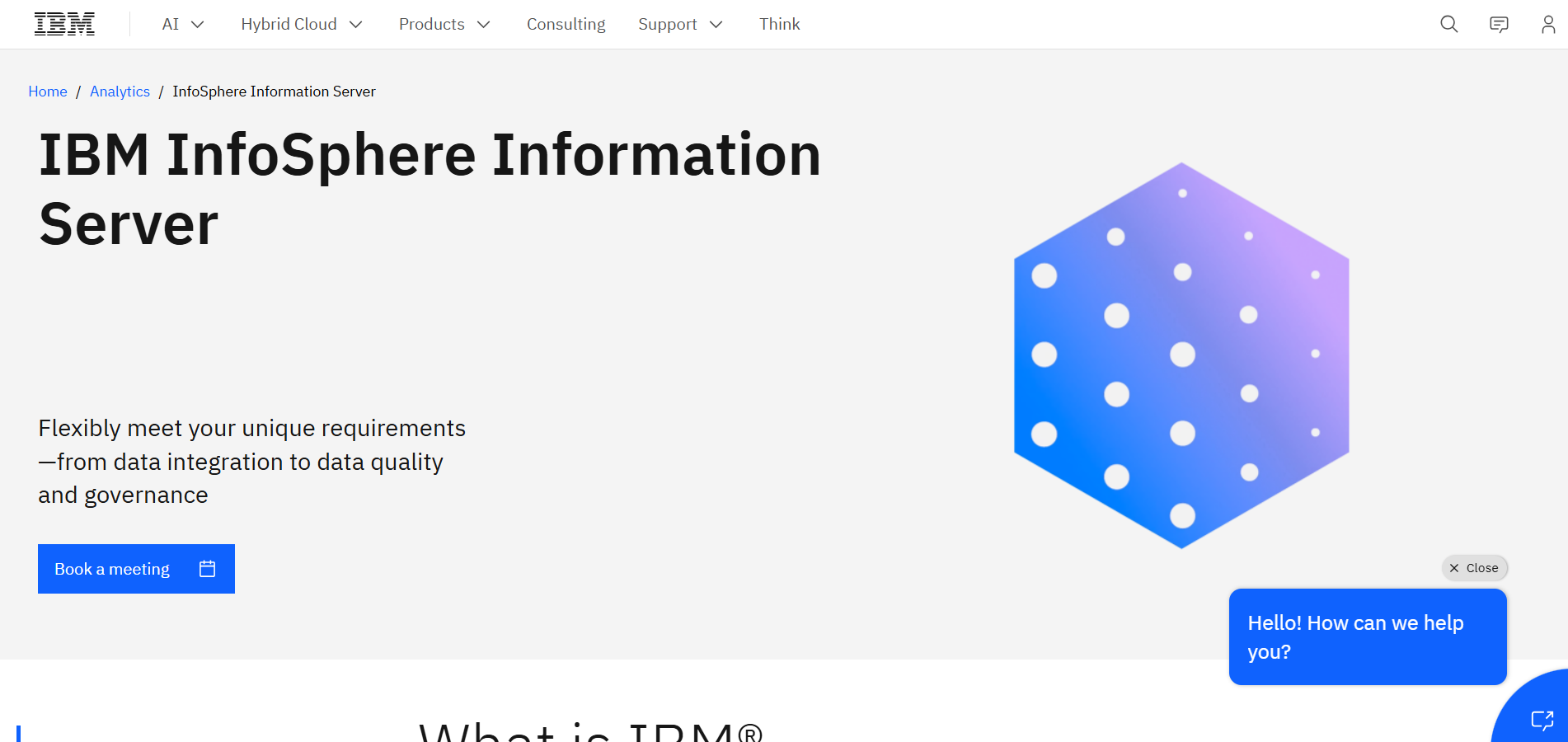
G2 Rating: 4.1(23)
IBM InfoSphere Information Server is a leading data integration platform that helps you understand, cleanse, monitor, and transform data more easily. The offerings provide massively parallel processing (MPP) capabilities that are scalable and flexible.
Key Features
- Integrate data across multiple systems: Get fast, flexible data integration that’s deployable on premises or in the cloud with this ETL platform.
- Understand and govern your information: Use a standardized approach to discover your IT assets and define a common business language for your data.
- Improve business alignment and productivity: Get a better understanding of current data assets while improving integration with related products.
Pricing: Depending on the size of your company, the service level needed, and the particular modules or components you want, IBM usually offers a variety of Infosphere versions and price choices.
Why Use It? Comprehensive data management with features like governance, analytics, and warehousing.
Best For: Enterprises with complex, high-volume data integration and governance needs.
9. Azure Data Factory
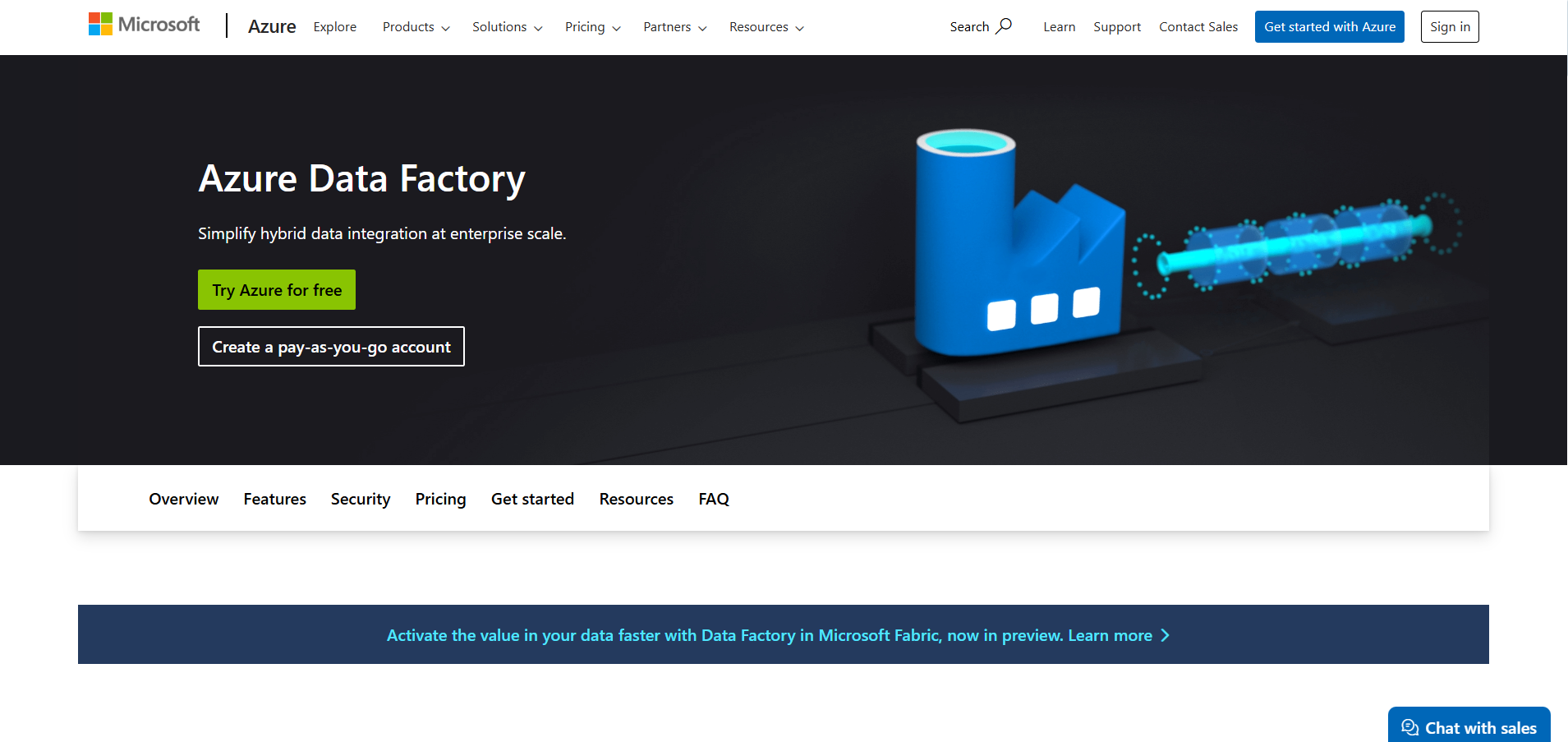
G2 Rating: 4.6(81)
Azure Data Factory is a serverless data integration software that supports a pay-as-you-go model that scales to meet computing demands. The service offers no-code and code-based interfaces and can pull data from over 90 built-in connectors. It is also integrated with Azure Synapse analytics, which helps perform analytics on the integrated data.
Key Features:
- No-code pipelines: Provide services to develop no-code ETL and ELT pipelines with built-in Git and support for continuous integration and delivery (CI/CD).
- Flexible pricing: Supports a fully managed, pay-as-you-go serverless cloud service that supports auto-scaling on the user’s demand.
- Autonomous support: Supports autonomous ETL to gain operational efficiencies and enable citizen integrators.
Pricing: Azure Data Factory supports free and paid pricing plans based on user’s requirements. Their plans include:
- Lite
- Standard
- Small Enterprise Bundle
- Medium Enterprise Bundle
- Large Enterprise Bundle
- DataStage
Why Use It: Cloud-native data pipeline orchestration for hybrid and on-premises data integration.
Best For: Companies with Azure cloud infrastructure looking to automate data workflows across platforms.
10. Google Dataflow
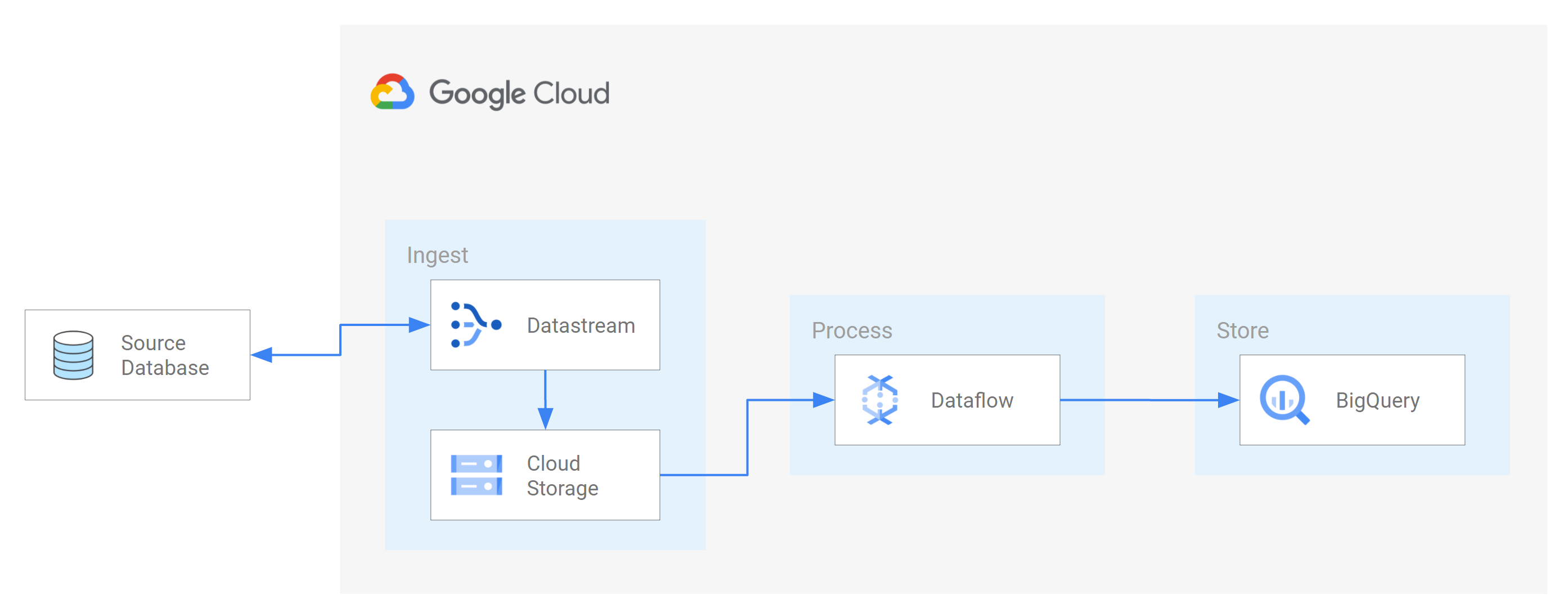
G2 Rating: 4.2(50)
Dataflow is a fully managed platform for batch and streaming data processing. It enables scalable ETL pipelines, real-time stream analytics, real-time ML, and complex data transformations using Apache Beam’s unified model, all on serverless Google Cloud infrastructure.
Key Features
- Use streaming AI and ML to power-gen AI models in real-time.
- Enable advanced streaming use cases at enterprise scale.
- Deploy multimodal data processing for gen AI.
- Accelerate time to value with templates and notebooks.
Pricing: Separate pricing for compute and other resources. You can check out their pricing page for details.
Why Use It: Stream and batch data processing with fully managed infrastructure by Google Cloud.
Best For: Google Cloud customers needing a serverless GCP ETL solution for real-time and batch data processing.
11. Stitch
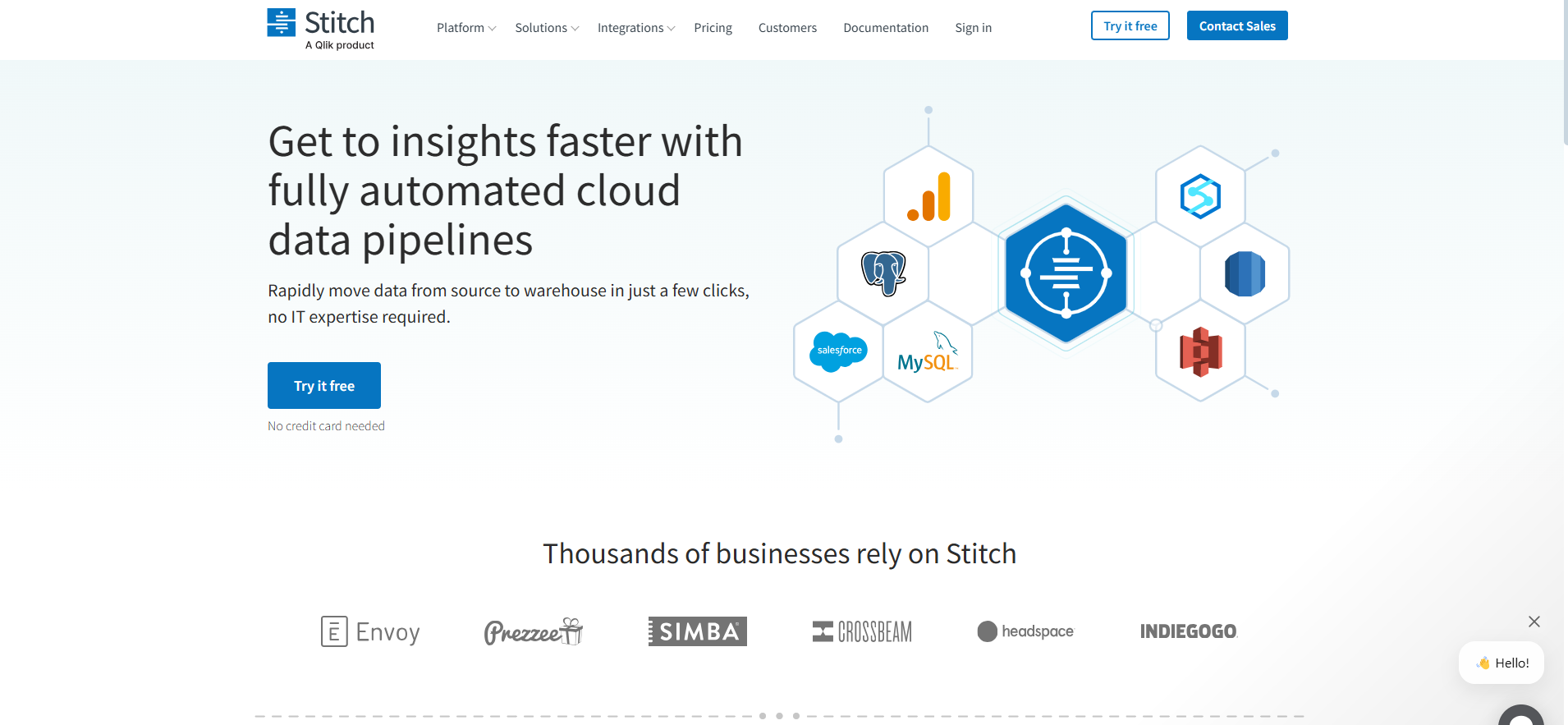
G2 Rating: 4.4(58)
Stitch is a cloud-first, open-source platform for rapidly moving data. It is a service for integrating data and gathering information from over 130 platforms, services, and apps. The platform centralizes this data in a data warehouse, eliminating the need for manual coding. Stitch is open-source, allowing development teams to extend the tool to support additional sources and features.
Key Features:
- Flexible Schedule: Stitch provides easy scheduling for when you need the data to be replicated.
- Fault Tolerance: Resolves issues automatically and alerts users when necessary in case errors are detected.
- Continuous Monitoring: Monitors the replication process with detailed extraction logs and loading reports.
Pricing: Stitch provides the following pricing plan:
- Standard-$100/ month
- Advanced-$1250 annually
- Premium-$2500 annually
Why Use It: Simple and fast SaaS-based ETL with automated connectors for small to medium businesses.
Best For: Data teams who need a simple, easy-to-use ETL tool with minimal configuration
12. Oracle Data Integrator(ODI)
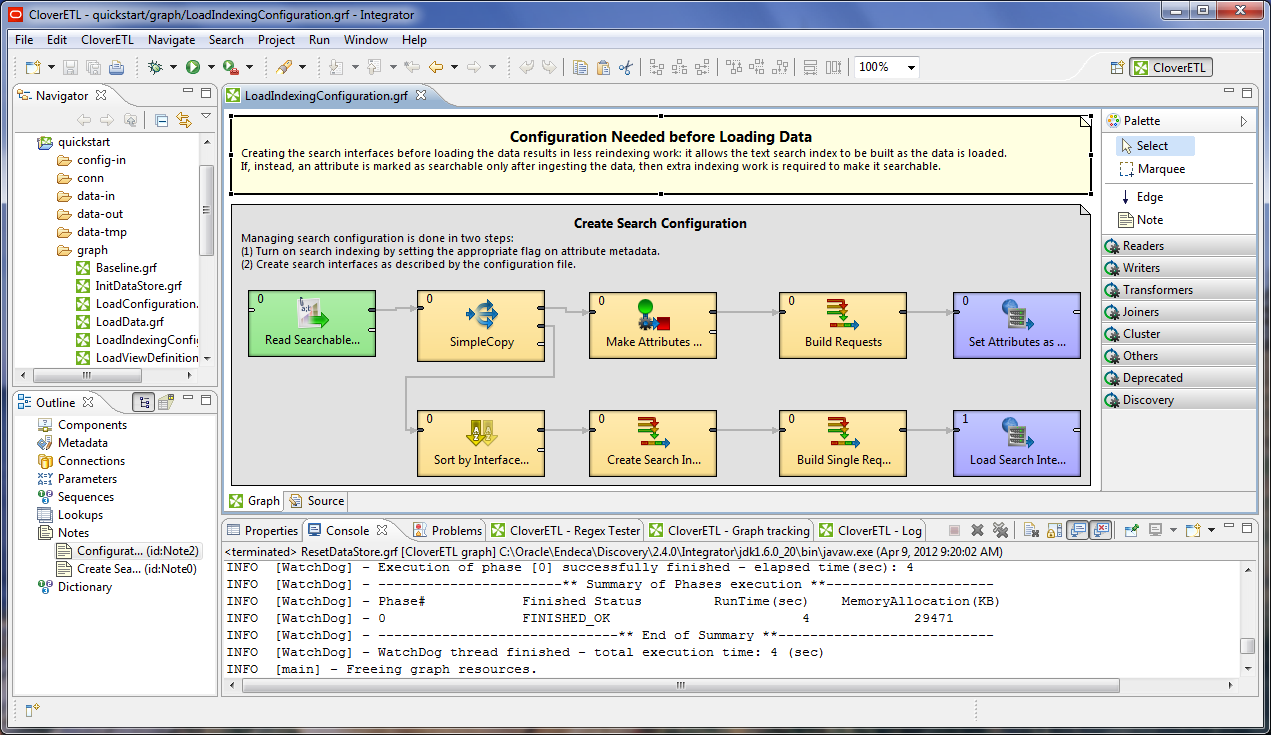
G2 Rating: 4.0(19)
Oracle Data Integrator is a comprehensive data integration platform covering all data integration requirements:
- High-volume, high-performance batch loads
- Event-driven, trickle-feed integration processes
- SOA-enabled data services
In addition, it has built-in connections with Oracle GoldenGate and Oracle Warehouse Builder and allows parallel job execution for speedier data processing.
Key Features
- Parallel processing: ODI supports parallel processing, allowing multiple tasks to run concurrently and enhancing performance for large data volumes.
- Connectors: ODI provides connectors and adapters for various data sources and targets, including databases, big data platforms, cloud services, and more. This ensures seamless integration across diverse environments.
- Transformation: ODI provides advanced data transformation capabilities.
Pricing: Oracle data integrator provides service prices at the customer’s request.
Why Use It? High-performance bulk data movement and transformation for Oracle and non-Oracle environments.
Best For: Enterprises heavily invested in Oracle technologies.
13. Integrate.io
G2 Rating: 4.3(199)
Integrate.io is a leading low-code data pipeline platform that provides ETL services to businesses. Its constantly updated data offers insightful information for organizations to make decisions and perform activities such as lowering their CAC, increasing their ROAS, and driving go-to-market success.
Key Features:
- User-friendly Interface: Integrate.io offers a low-code, simple drag-and-drop user interface, and transformation features – like sort, join, filter, select, limit, clone, etc. —that simplify the ETL and ELT process.
- API connector: Integrate.io provides a REST API connector that allows users to connect to and extract data from any REST API.
- Order of action: Integrate.io’s low-code and no-code workflow creation interface allows you to specify the order of actions to be completed and the circumstances under which they should be completed using dropdown choices.
Why Use It? Low-code ETL with rich transformations and a focus on ease of use.
Best For: SaaS-heavy businesses that need real-time data integration.
14. Fivetran
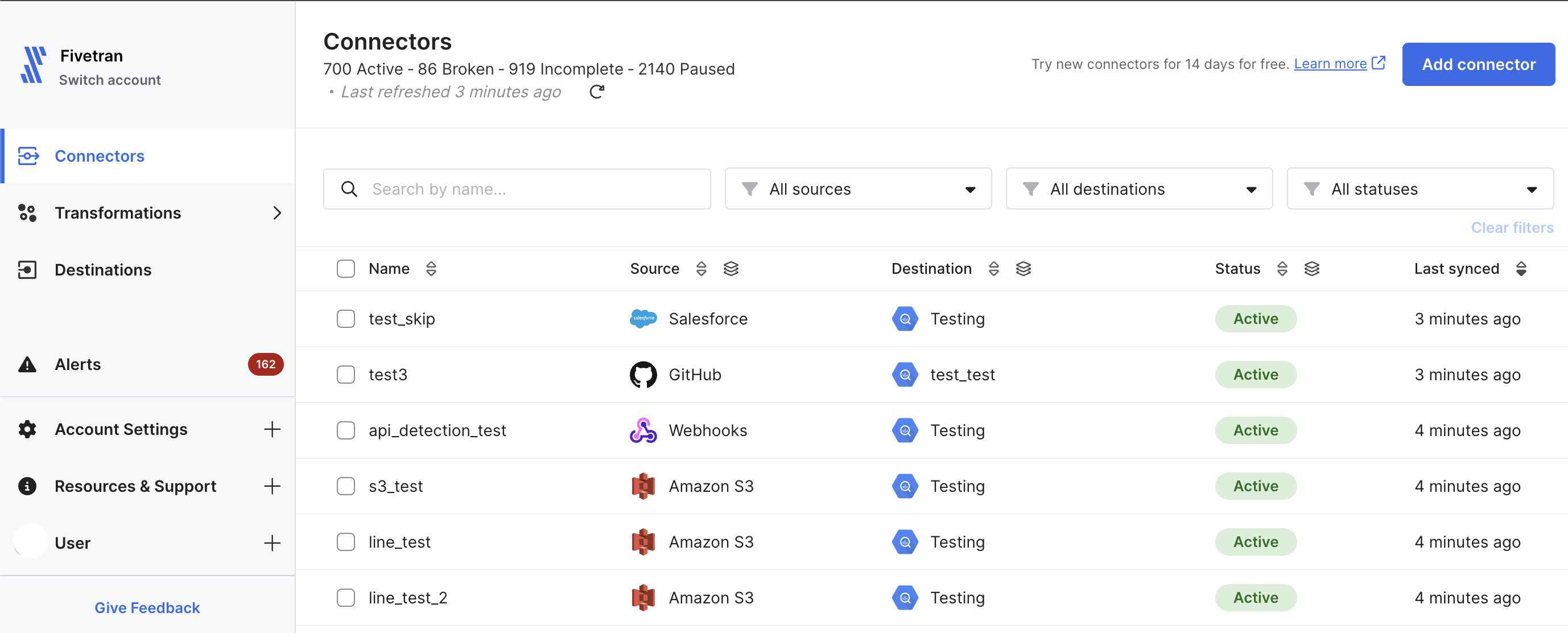
G2 Rating: 4.2(406)
Fivetran’s platform of valuable tools is designed to make your data management process more convenient. Within minutes, the user-friendly software retrieves the most recent information from your database, keeping up with API updates. In addition to ETL tools, Fivetran provides database replication, data security services, and round-the-clock support.
Key Features:
- Connectors: Fivetran makes data extraction easier by maintaining compatibility with hundreds of connectors.
- Automated data cleaning: Fivetran automatically looks for duplicate entries, incomplete data, and incorrect data, making the data-cleaning process more accessible for the user.
- Data transformation: Fivetran’s feature makes analyzing data from various sources easier.
Why Use It? Fully automated, reliable data replication with built-in schema evolution, support, and an extensive connector library.
Best For: Companies looking for automated data integration with minimal configuration.
15. Qlik
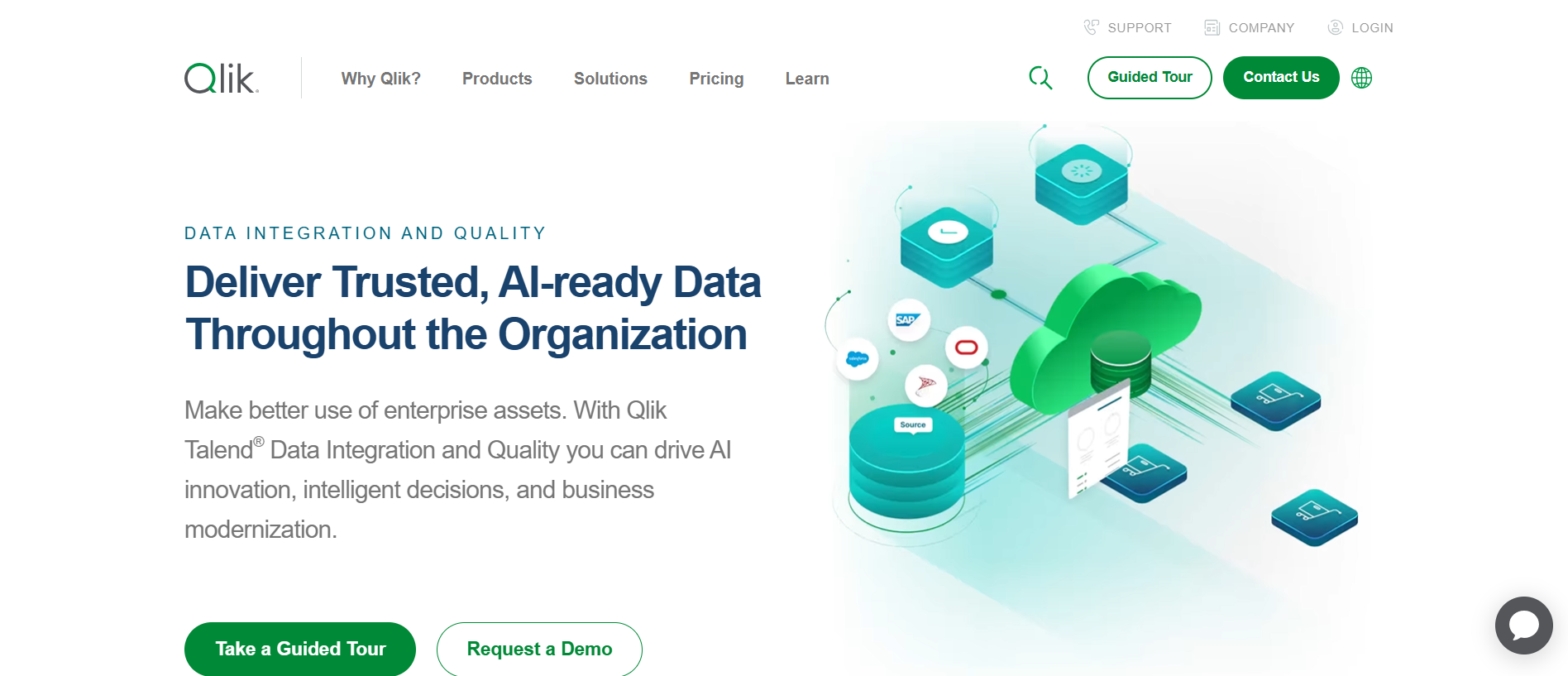
G2 Rating: 4.3(123)
Qlik’s Data Integration Platform is a comprehensive solution designed to streamline and accelerate data movement and transformation within modern data architectures.
Key Features
- Real-time Data Streaming: Captures and delivers high-volume, real-time data from diverse sources (SAP, Mainframe, databases, etc.) to cloud platforms, data warehouses, and data lakes.
- Automated Data Pipelines: Automates data transformation and delivery, reducing manual effort and minimizing errors.
- Enhanced Agility: Enables rapid data delivery across multi-cloud and hybrid environments, supporting agile analytics and faster insights.
- Data Warehouse Modernization: Automates the entire data warehouse lifecycle, accelerating the availability of analytics-ready data.
Why Use It: Real-time data movement with advanced analytics and visualization capabilities.
Best For: Teams focused on data analysis, business intelligence, and reporting.
16. Portable.io
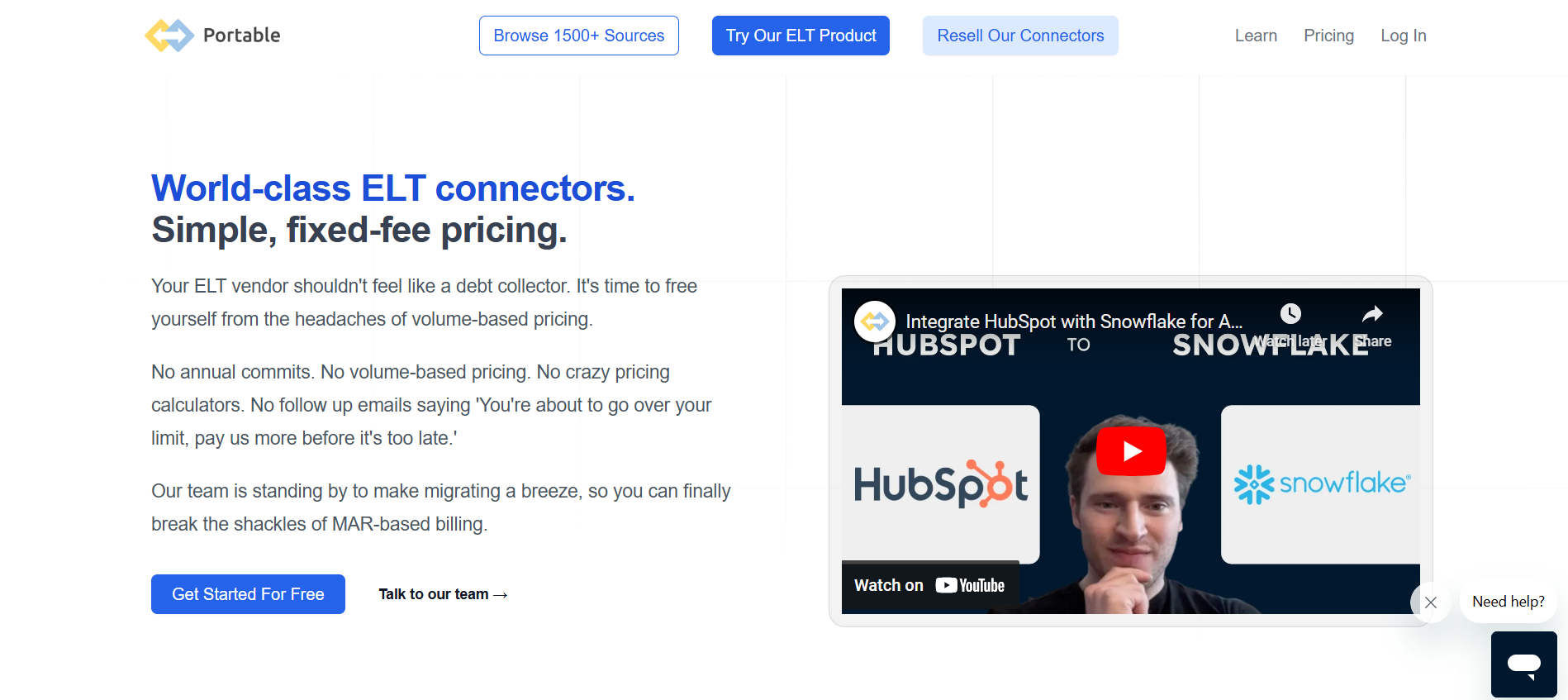
G2 Rating: 5.0(19)
Portable is a unique no-code integration platform that specializes in connecting to a vast array of data sources, including many that other ETL providers often overlook.
Key Features:
- Extensive Connector Library: Offers a massive catalog of over 1300 pre-built connectors, providing seamless integration with a wide range of SaaS applications and other data sources.
- User-Friendly Interface: Features a visual workflow editor that simplifies the creation of complex ETL procedures, making it accessible to users with varying technical expertise.
- Real-time Data Integration: Enables real-time data synchronization and updates, ensuring that data remains current and actionable.
Pricing: It offers three pricing models to its customers:
- Starter: $290/mo
- Scale: $1,490/mo
- Custom Pricing
Why Use It: Quick deployment of long-tail connectors tailored to niche data sources.
Best For: Small-to-medium businesses with a strong SaaS ecosystem.
17. Skyvia
G2 Rating: 4.8(242)
Skyvia is a cloud-based data management platform that simplifies data integration, backup, and management for businesses of all sizes.
Key Features:
- No-Code Data Integration: Provides a user-friendly interface with wizards and intuitive tools for data integration across databases and cloud applications, eliminating the need for coding.
- Flexible and Scalable: Offers a range of pricing plans to accommodate businesses of all sizes and budgets.
- High Availability: Hosted on a reliable and secure Azure cloud infrastructure, ensuring continuous data access and minimal downtime.
- Easy On-Premise Access: Enables secure access to on-premises data sources without complex network configurations.
Pricing:
It provides five pricing options to its users:
- Free
- Basic: $70/mo
- Standard: $159/mo
- Professional: $199/mo
- Enterprise: Contact the team for pricing information.
Why Use It? Cloud-based integration for syncing, migrating, and backing up data with ease.
Best For: Teams with limited technical expertise who need to automate data integration and backups.
See a detailed list of Skyvia alternatives
18. Matillion
G2 Rating: 4.4(80)
Matillion is a leading cloud-native ETL/ELT platform that empowers organizations to use cloud data warehouses and data lakes effectively.
Key Features:
- Seamless Cloud Integration: Integrates seamlessly with major cloud platforms like Snowflake, AWS Redshift, and Google BigQuery.
- Flexible Data Processing: Supports both Extract-Load-Transform (ELT) and Extract-Transform-Load (ETL) methodologies.
- Intelligent Orchestration: Utilizes PipelineOS for intelligent resource allocation and dynamic scaling.
- High Availability & Reliability: Ensures continuous data processing with high-availability features and robust error handling.
Pricing:
It provides three packages:
- Basic- $2.00/credit
- Advanced- $2.50/credit
- Enterprise- $2.70/credit
Why Use It? Cloud-native ETL optimized for modern data warehouses like Snowflake and BigQuery.
Best For: Teams working with cloud data warehouses that need a scalable ETL solution.
19. SSIS
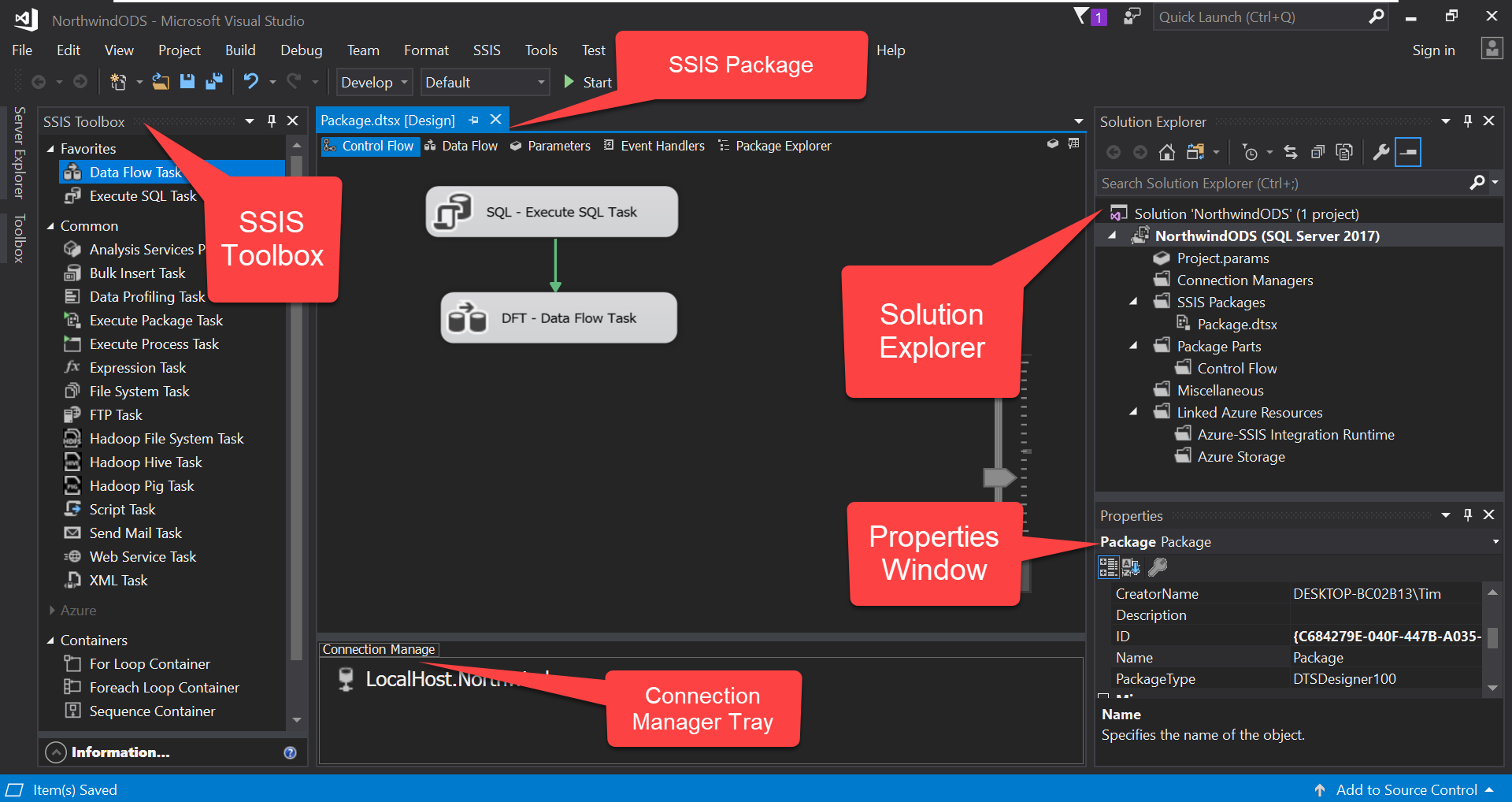
SQL Server Integration Services is a platform for building enterprise-level data integration and data transformation solutions.
Key Features
- Error Handling: Provides robust error-handling mechanisms, including logging, event handlers, and configurable error output paths.
- Customization Options: Allows developers to create custom tasks, components, and scripts using .NET languages (C#, VB.NET).
- Vast Integration Options: SSIS enables integration across various data sources, including databases (SQL Server, Oracle, MySQL), flat files, XML, Excel, and more.
Why Use It? Powerful ETL for Microsoft SQL Server with extensive transformations and control flow options.
Best For: Organizations heavily invested in Microsoft technologies
Pricing: It provides various pricing plans based on your needs.
20. Rivery
G2 Rating: 4.7/5(112)
Capterra Rating: 5/5(12)
Rivery is a powerful ELT platform famous for its flexibility and comprehensive data management capabilities. It provides an intuitive UI for quickly creating and handling data pipelines. Recently, Boomi, one of the leaders in the IPaaS industry, has acquired Rivery. Rivery supports real-time data processing, and many customizations regarding data transformations can be done to fit various complex workflows.
Key Features
- Customizable Setup: Provides a high level of flexibility, allowing users to tailor the setup according to specific needs, which can be advantageous for complex integrations.
- User-Friendly Design: Although it offers flexibility, users may need to familiarize themselves with the interface and configuration options.
- Visual Interface: The platform features a user-friendly visual interface, which simplifies the data transformation process and makes it accessible to non-technical users.
- Pre-Built Templates: Provides a variety of pre-built templates that streamline the setup of data workflows and integrations.
Pricing: Rivery’s pricing is based on RPU credits consumed.
- Starter: $0.75/RPU, ideal for small teams, limited users and environments.
- Professional: $1.20/RPU, for scaling teams, includes more users and environments.
- Enterprise: Custom pricing, for large enterprises with advanced needs.
Why Use It: Fully managed ELT with pre-built connectors and no-code workflows for faster delivery.
Pick Your Perfect ETL Tool: Quick Comparison Guide
| Tool | Ease of Use | Support | Integration Capabilities | Pricing |
| Hevo Data | User-friendly interface, No-code | 24/7 customer support, comprehensive documentation, | Supports 150+ data sources, real-time data | transparent tier-based pricing |
| Informatica PowerCenter | Complex- requires expertise | Extensive support options, community | Highly scalable, 200 pre-built connectors | Expensive, enterprise-focused |
| AWS Glue | Moderate, some technical knowledge required | AWS support, documentation, community | Integrates well with the AWS ecosystem, 70+ data sources. | Pay-as-you-go, cost-effective for AWS users |
| Google Cloud Dataflow | Moderate, technical knowledge is needed | Google Cloud support, community | Integrates with GCP services | Pay-as-you-go, flexible pricing |
| Fivetran | Very easy, automated | 24/7 support, extensive documentation | Supports 400+ data connectors, automated ELT | Subscription-based, transparent pricing |
| Stitch | Easy, simple UI | Standard support, community forums | Integrates with many data warehouses and supports 130+ connectors. | Transparent, tiered pricing |
| Matillion | Easy, visual interface | Good support, extensive documentation | Strong integration with cloud platforms, 100+ connectors | Subscription-based, varies by cloud |
| IBM Infosphere | Complex, requires expertise | Robust support, comprehensive | Extensive integration capabilities | Enterprise pricing, typically expensive |
| Oracle Data Integrator | Complex, requires Oracle ecosystem knowledge | Oracle support, community forums | Best with Oracle products, broad integration | Enterprise pricing, typically expensive |
| Skyvia | Easy, intuitive interface | Standard support, community forums | Supports cloud and on-premises sources | Transparent, tiered pricing |
| SSIS | Moderate | Microsoft support | Microsoft ecosystem | Part of SQL Server license. |
| Azure Data Factory | Moderate, Azure knowledge needed | Microsoft support, community | Integrates well with Azure services, 90+ connectors. | Pay-as-you-go, flexible pricing |
| Rivery | Very Easy | 24/7 support | Managed ELT | Custom pricing; starts at $0.75/credit. |
| Apache Airflow | Complex, requires expertise | Community support, some enterprise | Highly customizable, many integrations | Free, open-source |
| Integrate.io | Easy, drag-and-drop interface | 24/7 support, extensive documentation | Many pre-built connectors and 100+ SaaS applications. | Subscription-based, flexible pricing |
| Qlik | Moderate, some learning curve | Good support, community forums | Wide range of data connectors | Subscription-based, typically expensive |
| Airbyte | Easy, open-source, customizable | Community support | 350+ pre-built connectors | Free, open-source |
| Portable.io | Easy, customizable, low-code | Standard support, extensive documentation | Supports many data sources, real-time | Subscription-based, transparent pricing |
| Meltano | Moderate | Limited (Community) | Flexible with CLI tools. | Free (Open-source). |
| Hadoop | Complex, high technical expertise | Community support, some enterprise | Highly scalable, integrates with many tools | Open-source, but can be costly to manage |
Which Tool To Choose Based on Your Use Case?
| Use Case | Recommended Tools | Why |
| Real-Time Data Integration | AWS Glue, Google Cloud Dataflow, Hevo Standard, Rivery, Airbyte | Optimized for streaming data with low-latency capabilities. |
| Batch Processing | Hevo Edge, Fivetran, Stitch, Matillion, SSIS | Designed for processing large datasets on schedules with automation and efficiency. |
| Cloud ETL Tools | Azure Data Factory, AWS Glue, Matillion, Skyvia, Hevo | Cloud-native tools that integrate seamlessly with major cloud platforms. |
| Enterprise-Grade Solutions | Informatica PowerCenter, IBM Infosphere, Oracle Data Integrator | Comprehensive features for scalability, governance, and security in large organizations. |
| Small Business or Startups | Hevo Data, Stitch, Portable.io, Meltano | Affordable, user-friendly tools with simple setups suitable for smaller teams. |
| Data Orchestration | Apache Airflow, Azure Data Factory, AWS Glue | Powerful tools for scheduling, monitoring, and managing workflows. |
| No-Code/Low-Code Tools | Hevo Data, Fivetran, Matillion, Skyvia | Intuitive interfaces designed for users without coding experience. |
| Data Transformation Focus | Informatica PowerCenter, Matillion, IBM Infosphere, Hevo Data. | Robust transformation capabilities for complex data preparation. |
| Open-Source Solutions | Apache Airflow, Airbyte, Meltano, Hadoop | Free and customizable for teams with technical expertise. |
| Multi-Cloud Support | Matillion, Skyvia, Azure Data Factory, Hevo Data | Seamlessly integrates across multiple cloud platforms for hybrid and multi-cloud strategies. |
| IoT or Big Data Workloads | Google Cloud Dataflow, Hadoop | Built for high-velocity and large-scale data processing. |
| ETL + Analytics Integration | Qlik, Informatica PowerCenter | Combines data integration with powerful analytics and visualization features. |
| Hybrid and On-Premises | SSIS, IBM Infosphere, Oracle Data Integrator | Supports on-premise deployments and hybrid cloud environments. |
Check out our blog on ETL use cases to see how it’s used across industries.
Learn More About:
Conclusion
ETL pipelines are the engine for decision-making processes inside the organization. This step is crucial for preparing raw data for management and analysis. ETL solutions are simplified for advanced analytics, data processing, and enhancing end-user satisfaction. You should always select the most powerful ETL tool for your organization’s most significant strategic missions. Establish robust ETL requirements to streamline data pipelines, maintain consistency, and enhance data governance.
The choice of an ETL tool varies according to your data integration needs, budget, and existing technology stack. The tools above are among the best options available in 2025, each accompanied by its distinct strengths and features. Whether it is a simple, no-code solution or a robust, enterprise-grade platform, any ETL tool from this list will help you streamline your data integration process. Choose Hevo for a seamless ETL process. Sign up for a free trial and check out Hevo’s rich feature suit.
FAQs
What is the best cloud ETL tool?
Choosing the best cloud ETL tool depends on your specific needs, but some of the top options in 2025 include AWS Glue, Google Cloud Dataflow, Azure Data Factory, and Hevo Data.
Is AWS Glue ETL or ELT?
AWS Glue is primarily an ETL (Extract, Transform, Load) tool. It automates data extraction, transformation, and loading, making it easier to prepare and move data for analytics.
Which ETL tool is in demand in 2025?
As of 2025, some of the most in-demand ETL tools include Hevo Data, AWS Glue, Databricks, and Azure Data Factory. These tools are popular due to their scalability, ease of use, and integration capabilities with various data sources and services.
Is Snowflake an ETL tool?
Snowflake is not primarily an ETL tool; it’s a cloud data platform. However, it has built-in data transformation capabilities and can work seamlessly with ETL tools like Hevo Data, Matillion, and Talend to provide a complete data pipeline solution.






